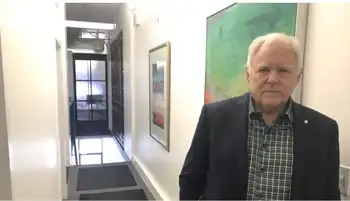1935 law threatens PacifiCorp deal
By The Oregonian
Protective Relay Training - Basic
Our customized live online or in‑person group training can be delivered to your staff at your location.

- Live Online
- 12 hours Instructor-led
- Group Training Available
The 1935 Public Utility Holding Company Act regulates utilities with operations in multiple states and prohibits those companies from operating nonutility businesses. It was created to prevent conglomerates from amassing utilities over vast geographic stretches and exposing consumers to risky corporate ventures unrelated to electricity service.
MidAmerican executives - along with the company's chief investor, Warren Buffett - say the law is an anachronism. They support its repeal, which Congress is considering as part of a comprehensive energy bill.
But many consumer advocacy groups, including the Citizens' Utility Board in Oregon, say PUHCA is all that stands between electricity ratepayers and an onslaught of mega-mergers. The MidAmerican-PacifiCorp merger, along with others to come if Buffett makes good on promises of more investments in the energy sector, is a case in point, they say.
Buffett "wants to create an empire," said Jason Eisdorfer, an attorney for the Citizens' Utility Board. "If PUHCA is repealed, we could end up with two or three electric utilities in this country - and Buffett will be one of them."
The contrasting views signal what could become a full-blown fight as federal and state regulators review the $9.4 billion MidAmerican- PacifiCorp deal. The clash mirrors similar debates involving other proposed acquisitions seeking regulatory approval: Excelon Corp.'s $12 billion purchase of Public Service Enterprise Group Inc. and Duke Energy Corp.'s $9.1 billion purchase of Cinergy Corp.
All would merge utilities that operate in multiple states and, in some instances, in different parts of the country. Such breadth appears to run afoul of a PUHCA provision that says any newly combined utility must be a "single integrated public-utility system." Some have interpreted that to mean that the law prohibits acquisition of geographically distant assets.
Christine Lezak, a policy analyst with the Stanford Washington Research Group in Washington, D.C., said MidAmerican "would be very hard-pressed to clear PUHCA hurdles, particularly those that require utilities to be in the same geographic region," in its effort to buy PacifiCorp.
Lezak noted that a failure to meet the geographic requirement sent American Electric Power's 2000 acquisition of Central & South West Corp. back to the Securities and Exchange Commission, where an administrative law judge found the acquisition should be denied. The SEC administers the utility act.
PacifiCorp has 1.57 million customers in six states -- Oregon, Washington, Utah, Wyoming, Idaho and California. MidAmerican, headquartered in Des Moines, Iowa, serves 680,000 electricity customers and 660,000 natural gas customers in Iowa, Illinois, Nebraska and South Dakota.
PacifiCorp operates within a transmission grid system known as the Western Interconnection. MidAmerican operates in the Eastern Interconnection.
Lynn Hargis, an attorney with Public Citizen in Washington, D.C., called it "completely absurd" that MidAmerican would argue that utilities operating in separate interconnections represented a single integrated system. "That's an obvious joke."
Hargis said MidAmerican, along with Excelon and Duke, are "all gambling on PUHCA repeal."
David Sokol, chairman and chief executive of MidAmerican, said he supports the law's repeal because it has outlived its usefulness. In today's corporate environment, he said, PUHCA prevents companies with plenty of money to spend -- such as Buffett's Berkshire Hathaway -- from injecting much-needed cash into the capital- intensive energy industry.
Sokol says the merger proposal passes regulatory muster, with or without PUHCA. MidAmerican operates over long reaches of sparsely populated countryside, as does PacifiCorp, he said. The united utilities would expand that pattern.
"PUHCA never intended to discriminate against sparsely populated states," Sokol said. "When you look at the operations and the interrelations... it's clearly a single region."
Although many analysts touted the acquisition announcement as a plus for MidAmerican, they saw PUHCA as a formidable hurdle.
"There could be pretty serious scrutiny whether this satisfies PUHCA," said Jim Bellessa, an energy industry analyst with D.A. Davidson in Great Falls, Mont. State regulators also will have to approve the deal before it can close, which means that utility commissions in each of the six states in which PacifiCorp operates will review the transaction.
"It takes a Herculean attempt to make an acquisition in this field because of the regulatory scrutiny that goes on," Bellessa said.











